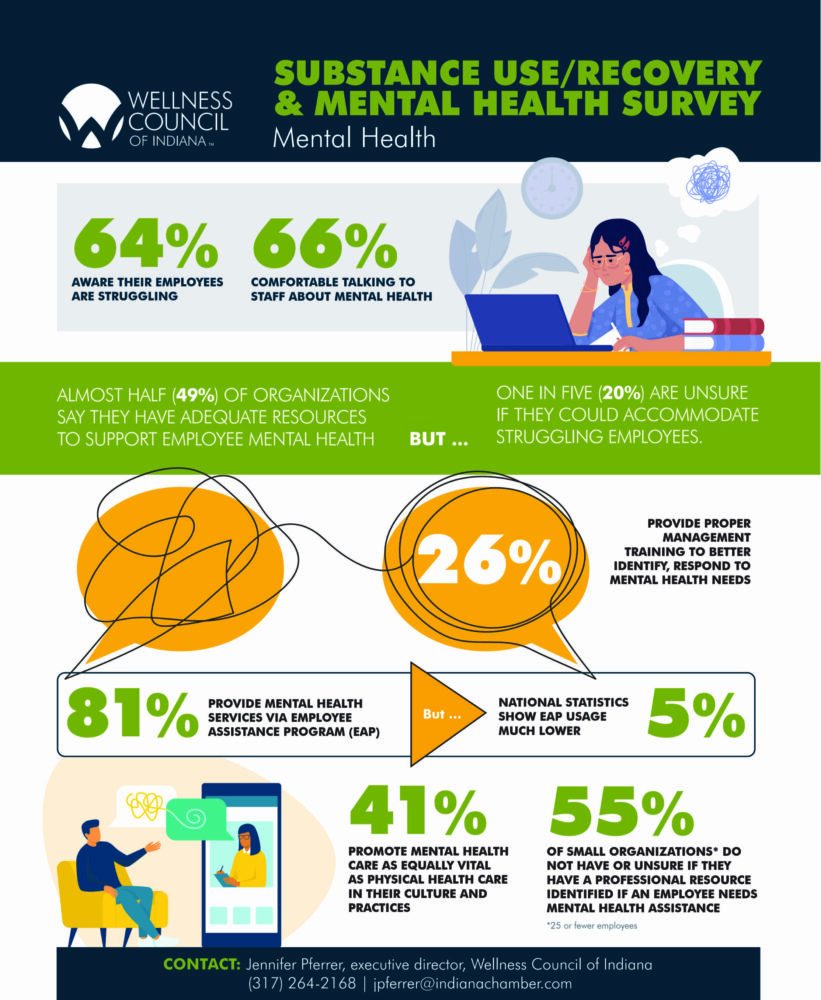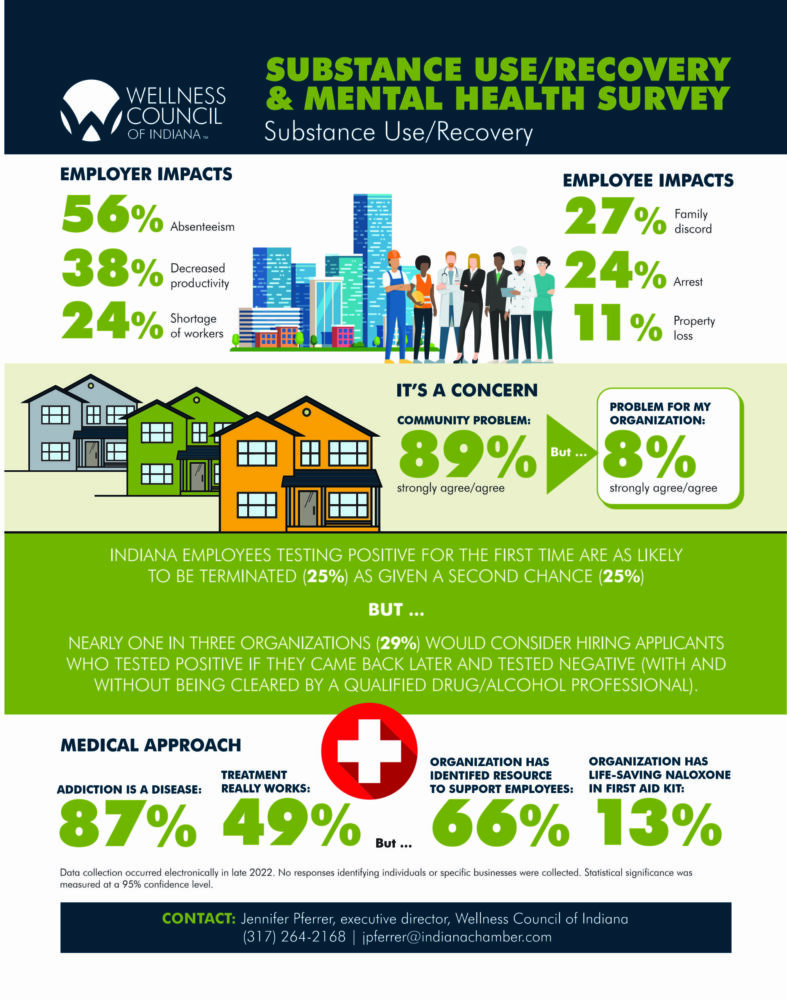A statewide employer survey from the Wellness Council of Indiana shows that while progress has been made in recognizing addiction and mental health diseases, too often support is still lacking when it comes to programs and policies to help those workers.
“We have 46% of employers that have set procedures if they know somebody is having difficulties with substance misuse or alcohol. But that means we have 50% of employers that don’t have set procedures, which in today’s world with the proliferation of drugs is kind of staggering in my mind,” offers Jennifer Pferrer, executive director of the Wellness Council of Indiana, a subsidiary of the Indiana Chamber of Commerce.
Lack of awareness and lingering stigma, she stresses, persist and contribute as big factors. “We only have 8% (of employers) who think that alcohol and substance misuse is a problem in their organization, which is even less than where we were as a baseline in 2019 (at 13%) when we started these surveys,” Pferrer states.
“For some reason, employers remain convinced (that while drug misuse) is happening in their community, ‘It’s outside of my organization.’ That’s something we need to continue to really focus on, because it is happening within your workforce, and it’s beneficial from the employee and employer side to do something meaningful to support those individuals.”
Perhaps largely a result of employer sentiment that drug misuse is occurring off site, very few employers – 13% – have potentially life-saving Naloxone in their first aid kit to reverse an opioid overdose.
“It’s such an easy thing for employers to do. I’m disappointed that we don’t have more of them taking advantage of that especially when in most counties, they can get it from their local health department,” Pferrer notes. “So, clearly we need to continue to beat that drum.”
In 2021, 58% of employer respondents indicated they were aware their employees were struggling. That number has jumped significantly to 64%, affirming the impact the pandemic has had on mental health awareness and its importance, Pferrer states.
What’s more, 66% of responding organizations shared they were comfortable talking to their employees about mental health.
In contrast to substance misuse, Pferrer says many employers have taken an initial step with an offering to staff, but there’s a utilization problem with it.
“The good news is that we have 81% of the employers providing mental health services through their employee assistance program (EAP). But national statistics report EAP usage is woefully low (under 5%). So unfortunately, unless there is repeated communication about the EAP, it’s not going to generate the intended and necessary outcome.”
So on top of any EAP, Pferrer recommends proper training on mental health for their management team and especially frontline personnel like those leading human resources.
“That’s the most helpful action employers can take regarding the mental health of their workers. Have someone or more than one person who can recognize the signs and provide sincere engagement to get the employees to the adequate resources they need.”
The survey found only 26% of employers are offering this type of management training. One option for that education is through the Wellness Council of Indiana’s Mental Health First Aid program. The goal of that effort, Pferrer explains, is for “participants to leave with an improved understanding and an action plan to safely and responsibly identify potential mental illness and substance use disorders, which are often intertwined.”
The Mental Health First Aid training sessions are available virtually throughout the year or Wellness Council educators can come on site.
Another takeaway from this survey is that there’s been an equalization among employer size regarding engagement.
“There used to be a disproportionate number of large employers that felt like they could adequately support their workforce than the smaller organizations. But now, regardless of employer size, employers are starting to find the resources that they need,” Pferrer relays.
While that’s encouraging, she says more of that is needed and has a simple yet important message for all employers to take to heart.
“You don’t need to do this on your own,” Pferrer maintains. “There are a number of organizations that can help you navigate this. There are community partners, and the state has invested millions of dollars to ensure there’s an infrastructure employers can tap into – and not just the employers but that the workforce can tap into.
“And if an employer truly wants to be an organization that is supporting their workforce with mental health and substance misuse, there are best practice second-chance policies that are available through the Wellness Council,” she relays.
This is the third iteration of the Wellness Council of Indiana’s statewide employer survey. Anonymous data collection was completed in late 2022.
A total of 465 employers throughout Indiana from 10 industries took part in this latest examination, with nearly three-fourths of respondents employing fewer than 300 workers.
The complete report about attitudes and practices concerning substance misuse in the workplace and the mental health well-being of the workforce is available at www.indianachamber.com/WCIsurvey and www.wellnessindiana.org.








